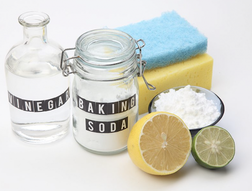Wellness Wednesday - Environmental Wellness

Environmental Wellness
Your everyday environment can have a huge impact on your physical and mental health. If you’re in a less-than-ideal living environment, it’s likely that you’re constantly feeling stressed, and you may find it harder to maintain a healthy lifestyle.
Sometimes it can be challenging to take control of our environment and make positive changes. However, you don’t necessarily have to move to a new home to improve your living situation. There are plenty of small changes you can make that will have a big impact on your overall well being.
Here are seven strategies for improving your environmental wellness:
1. Replace Chemical Cleaning Products with Natural Alternatives
It’s important to be aware of the harmful chemicals present in many conventional cleaning products. These chemicals can be toxic and harmful to both your health and the environment.
There are plenty of natural alternatives to chemical-based cleaners. Baking soda, vinegar, lemon juice, and essential oils are all great options for creating natural cleaning products.
2. Reduce Allergens and Improve the Air Quality in Your Home
If you often have itchy eyes, sneeze a lot, or feel wheezy, you might be allergic to dust or other allergens in your home.
There are a few things you can do to reduce allergens in your environment. The first step is keeping your home clean and free of dust. Make sure your bedding is washed regularly. Use a vacuum cleaner and open windows to improve ventilation whenever possible.
You can also consider investing in an air purifier. This will help to remove allergens from the air and improve your indoor air quality.
3. Declutter
A cluttered home not only looks bad; it can also be bad for your mental health. A messy environment with too many objects and surfaces creates a lot of visual stimuli, which increases stress levels. It’s easy to feel overwhelmed when there are items piled up everywhere and you’re surrounded by clutter.
The best way to deal with this is to start by decluttering one area at a time. Begin by sorting through your belongings and getting rid of anything you don’t need or use. You’ll be surprised at how much lighter and calmer you’ll feel once you’ve decluttered your home.
4. Get More Nature in Your Life
Exposure to nature has a significant impact on our mental and physical wellbeing. When we spend time outdoors, it reduces stress levels and boosts both mood and self-esteem.
You don’t necessarily need to move to an area surrounded by natural beauty, as there are plenty of ways you can bring nature into your home environment too. Adding a few houseplants, going for walks outdoors, or using natural materials like bamboo in your decor are all great ways to get more nature into your life. Even putting up a photo or painting of a beautiful landscape can positively impact your mood.
5. Limit Your Screen Time
Technology is a massive part of everyday life these days. We use our smartphones, tablets, and laptops daily for both personal and work reasons. However, this can have a negative impact on mental health if it becomes excessive.
Think carefully about how you use screens in your home. For example, instead of watching television in bed, turn it off a couple of hours before you plan to sleep and read instead.
If you’re working from home, make sure you take regular screen breaks and get up and move around throughout the day. And when you’re not using your devices, turn them off completely to avoid the temptation to check them constantly.
6. Use Eco-friendly and Recycled Materials in Your Home
Using eco-friendly and recycled materials is a great way to reduce your environmental impact.
This is great for the planet, of course. But feeling like you’re doing something positive for the environment can also positively impact your mental health.
Start with small steps like reducing the amount of plastic you use. For example, using reusable cotton produce bags or avoiding plastic straws are easy ways to reduce your use of single-use plastics.
Simple things like not leaving the tap running while you’re brushing your teeth or turning off the light when you leave a room can also make a big difference.
7. Create a Stress-Free Zone in Your Home
Your home should be a relaxing haven where you can escape from the stresses of everyday life. In practice, of course, this is easier said than done, particularly if you have a busy family life.
Instead, dedicate one room or corner of your home as a stress-free zone. This could be your bedroom, a corner of the living room, or even a garden shed. Make it a place where you can relax and de-stress in peace.
Fill the space with things that make you happy, such as plants, candles, photos of loved ones, or soft furnishings. And use the space to read, nap, meditate or simply relax.
Every home should have a stress-free zone where you can retreat to when life starts getting too much!
Posted on


